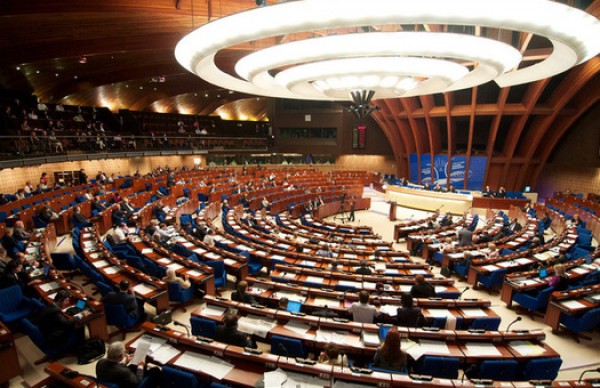Kyiv, April 9, 2014. The Parliamentary Assembly of the Council of Europe (PACE) will vote tomorrow on whether to introduce sanctions against Russia which may include stripping the Russian delegation of its powers in the organization and denying RF the right to vote, said Serhiy Sobolev, the head of Ukraine’s “Fatherland” (“Batkivshchyna”) party. This had been confirmed earlier by the head of Russia’s delegation to PACE Aleksei Pushkov. The last time a similar measure was introduced against Russia was during the war in Chechnya. The measures, if introduced, are a response to Russia’s military intervention in Crimea, followed by the illegal annexation of the peninsula, which was carried out in violation of the 1994 Budapest Memorandum.
In March, the British government recommended that Russia be stripped of its right to participate in another platform on the international arena – the Parliamentary Assembly of the Council of Europe. The suggestion resulted in two initiatives, one to strip the Russian delegation of its powers in PACE, proposed by Britain’s Robert Walter, and the other to deny Russia its voting right, submitted by Danish Michael Aastrup Jensen.
The Russian delegation, which continues to insist on illegitimacy of the current Ukrainian authorities in order to justify Russia’s land grab in Ukrainian Crimea, still remains in the absolute minority, said Sobolev. According to the Ukrainian politician, the recommendation to revoke the power and voting rights of the Russian delegation in PACE is almost unanimous. Reportedly, the governments of 43 of PACE’s 47 member countries support Ukraine.
On March 1, 2014, the Russian military invaded the sovereign Ukrainian territory of Crimea. The occupation was followed by the March 16 plebiscite during which the residents of the peninsula had to decide whether to become a part of a third state – the Russian Federation, or to break away from Ukraine. The so-called referendum did not even offer a status quo option. At gunpoint, the illegal referendum resulted in overwhelming voter turnout, which in some instances exceeded 120 percent of the population.
The situation was aggravated by the position of the Russian President, Foreign Minister and UN representative, all of whom have been quite content to act indifferent to this truth. The Kremlin has manipulated facts to its own advantage, stating that under the Budapest Memorandum Russia “did not undertake an obligation to force part of Ukraine to stay within its territory against the will of the local population”.
By compromising the territorial integrity of Ukraine and annexing a part of the country, Russia violated numerous international treaties and conventions.
The infamous referendum in the Crimean Autonomous Republic was held in flagrant violation of the Constitution of Ukraine, which stipulates unconditionally that any changes to the territorial composition of Ukraine must be decided exclusively by an all-Ukrainian referendum.
In addition to the Budapest memorandum, Russia has violated its commitment to respect the borders of Ukraine in Article 6 of the “Treaty between the USSR and the RSFSR” of November 19, 1990, in the “Treaty of Friendship, Cooperation and Partnership” of May 31, 1997, after the collapse of the Soviet Union, as well as in Article 5 of the “Treaty on the Ukrainian-Russian state border” of January 28, 2003.
Notably, on March 27, 2014, the United Nations held a General Assembly during which an unprecedented one hundred UN members supported Ukraine’s territorial integrity and denounced Russia’s recent military intervention in the country.




